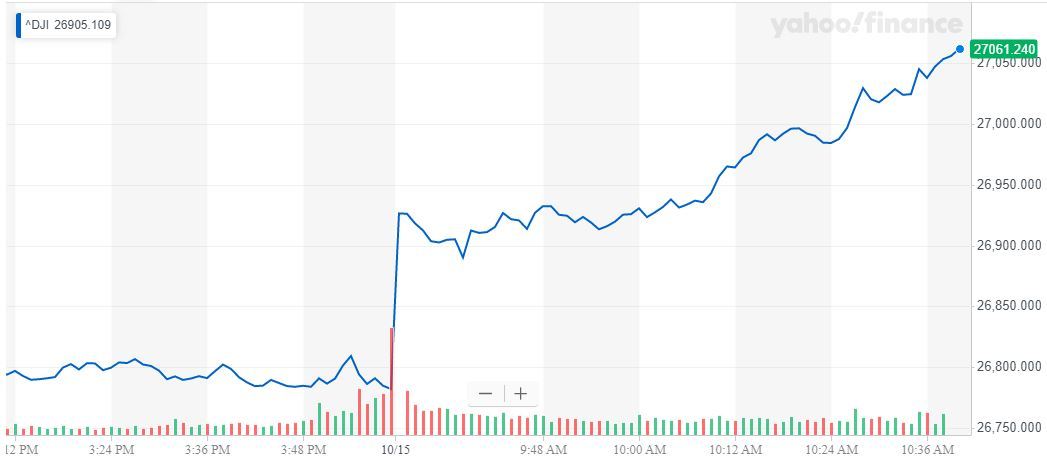Dow Grinds Higher as Fed Dove Bullard Teases Aggressive Rate Cuts

The Dow recovered on Tuesday after Fed dove James Bullard teased aggressive stimulus that, if needed, could slash interest rates to zero. | Source: REUTERS / Brendan McDermid
The Dow zoomed higher on Tuesday as dovish commentary from the Federal Reserve offset concerns about the partial trade deal President Donald Trump and Chinese negotiators shook hands on last week.
Dow Eyes Triple-Digit Recovery on Tuesday
All of Wall Street’s primary indices jumped at the opening bell and continued to climb throughout the morning. As of 10:42 am ET, the Dow Jones Industrial Average had surged 259.55 points or 0.97% to 27,046.91.

UnitedHealth Group, the Dow’s fourth-largest component, led the index with an 8.15% upswing following a mammoth earnings surprise.
The S&P 500 rose 29.68 points or 1.00% to 2,995.83.
The Nasdaq led its peers with an 89.37 point or 1.11% rally to 8,138.02.
Bullard: Fed Could Slash Interest Rates to Zero
Stocks rose after earnings season got off to a stronger-than-expected start, and one of the Federal Reserve’s most outspoken doves strengthened the recovery by suggesting that the US central bank may continue to lower interest rates to bolster the market.
According to Reuters, St. Louis Federal Reserve Bank President James Bullard said that global trade tensions could spur the FOMC to continue lowering interest rates .
The Fed “may choose to provide additional accommodation going forward,” Bullard said at a conference in London. He said that those “additional accommodations” could include slashing interest rates all the way to zero and resuming quantitative easing.
Bullard has consistently adopted a more dovish tone than many of his FOMC colleagues. At last month’s policy meeting, he voted for a 50 basis point rate cut, while the majority favored a 25 basis point reduction, and two voters disagreed with cutting rates at all.
Given this internal dissension, Bullard stressed that the Fed would proceed on a “meeting-by-meeting basis,” but he added that the trade war had opened a global “Pandora’s box” and said that he’s “not expecting any of this to go away in the years ahead.”
US & China ‘on Same Page,’ But Skeptics Fear ‘Decoupling’
Like Bullard, investors continue to treat the US-China trade war as the greatest threat to the stock market, as well as the economy’s longest-ever expansion.
The two economic superpowers outlined a partial trade deal last week, and while it has not yet been signed, Chinese officials say that Beijing and Washington are “on the same page.”
“China and the US are on the same page and have no difference in the stance on reaching a trade deal,” Chinese foreign ministry spokesperson Geng Shuang said. “This trade deal is going to carry very important meaning to China, the US and the world, it will be beneficial for world trade and world peace.”

That said, Bloomberg reports that even “phase one” of the trade deal faces a significant barrier . To fulfill its pledge to purchase $50 billion worth of US agricultural goods annually, China might need to eliminate tariffs on US imports. However, Beijing isn’t likely to remove those tariffs unless the Trump administration adopts a corresponding tariff reduction.
Meanwhile, business leaders and economists are warning investors to brace for a US-China economic “decoupling” that could occur if future rounds of trade negotiations fizzle out.
“The Americans seem determined to decouple with China. China has seen it happening, and has realized that it can decouple because its economy is large enough,”Ho Kwon Ping, executive chairman of major hospitality brand Banyan Tree Holdings, said on Tuesday at the Forbes Global CEO Conference in Singapore.
Market Ignores Trump’s Turkey Threat
Elsewhere, traders mostly ignored Trump’s threat to “immediately” sever trade negotiations with Turkey and hike tariffs on Turkish steel to 50%.
The Turkish lira rose more than 0.6% against the US dollar.